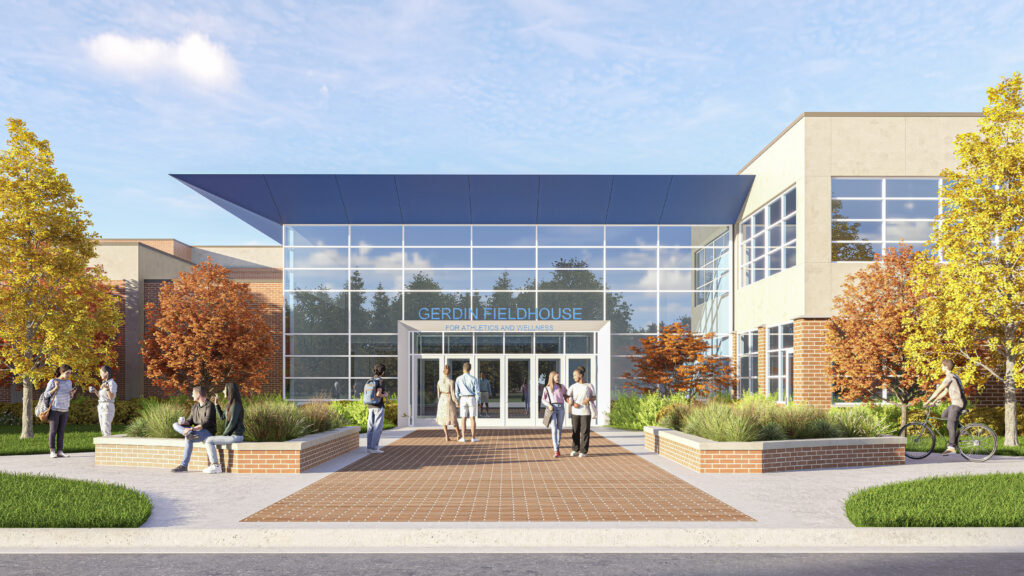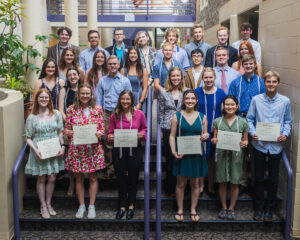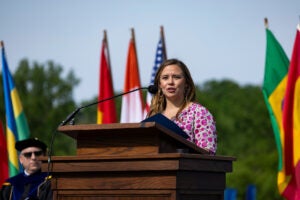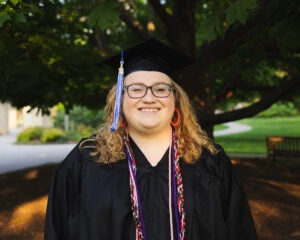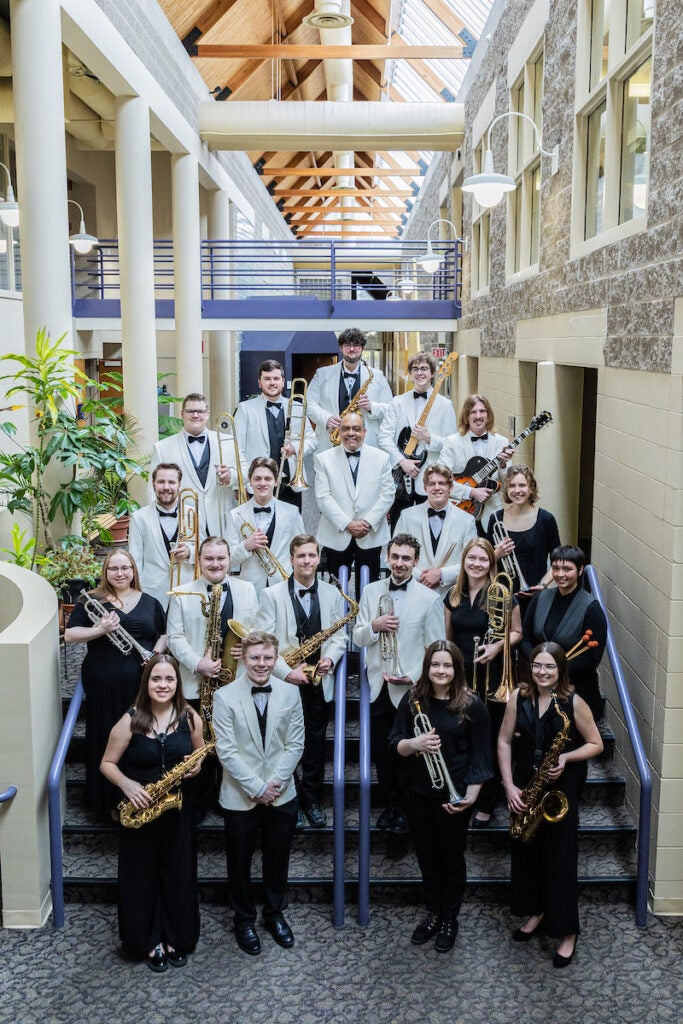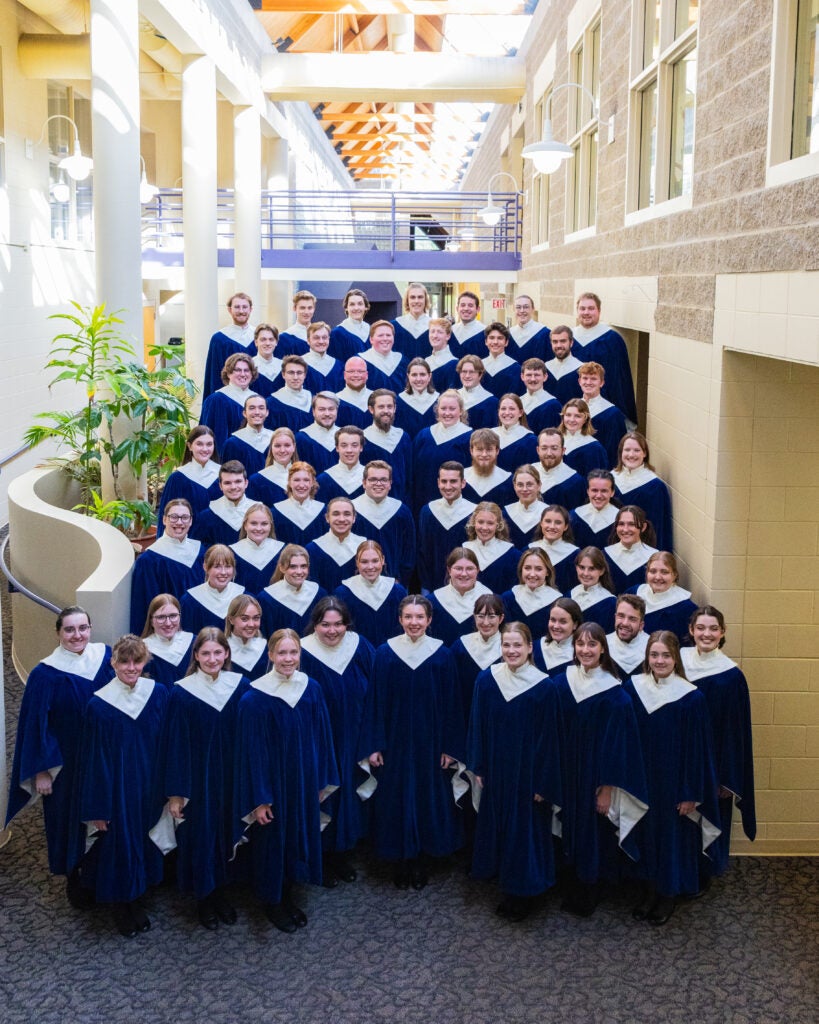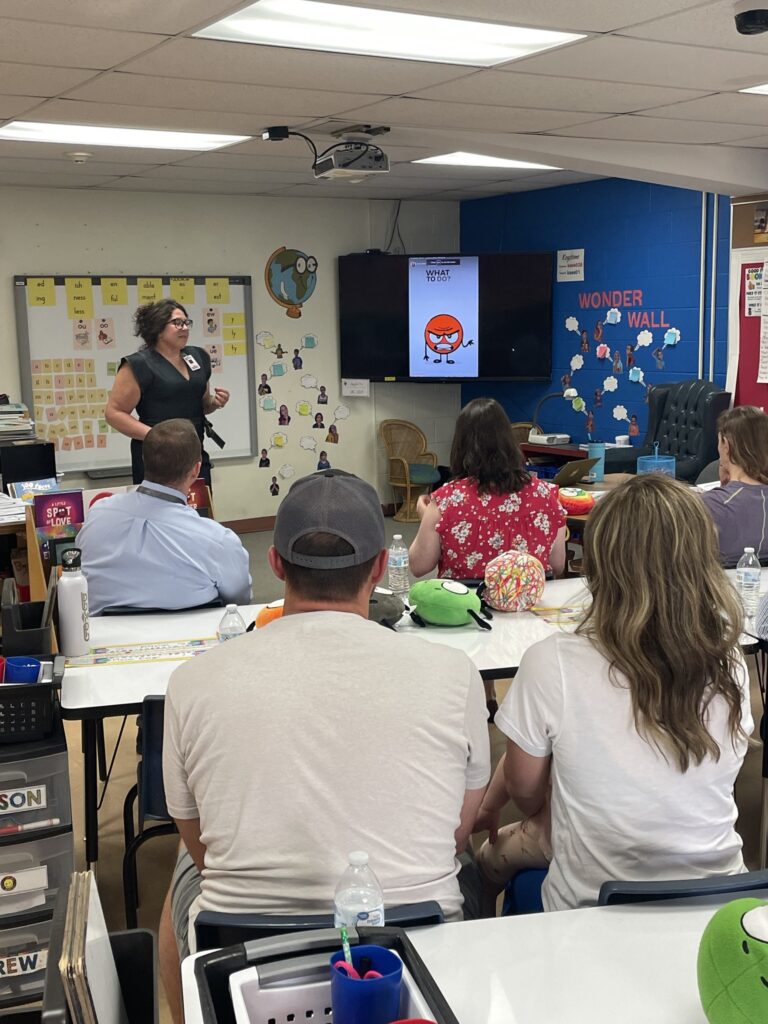DECORAH, IOWA—Luther College’s Spring 2024 Dean’s List includes 577 students; 61 first-years, 114 sophomores, 152 juniors and 250 seniors. To be named to the Dean’s List, a student must earn a semester grade point average of 3.5 or better on a 4.0 scale and must complete at least 12 credit hours with 10 hours of conventional grades (A, B, C, D).
Jane Addams, Senior, Decorah, Iowa
Durah Albadr, Sophomore, Basra, Iraq
Jake Althaus, Sophomore, Durango, Iowa
Getruda Amos, Senior, Mwanza, Tanzania
Jeremy Andera, Junior, Cresco, Iowa
Riley Anderson, Sophomore, Urbandale, Iowa
Micah Anderson, Sophomore, Elko New Market, Minn.
Allie Anderson, Senior, New Ulm, Minn.
Charlie Anderson, Senior, Woodbury, Minn.
Karlton Anderson, Sophomore, Baxter, Minn.
Eva Anderson, Senior, Ames, Iowa
Rose Anderson, Sophomore, Oregon, Wisc.
Blake Anderson, Senior, Oregon, Wisc.
Charlotte Appel, Senior, Lynnwood, Wash.
Harrison Arnold, Junior, Marion, Iowa
Nora Baer, Senior, Lake City, Minn.
Conor Baesemann, First-year, Pleasanton, Calif.
Bella Bamlett, Junior, Fort Atkinson, Wisc.
Anna Barbknecht, Senior, Eden Prairie, Minn.
Cole Barrett, Senior, Decorah, Iowa
Anna Bartsch, Sophomore, Nerstrand, Minn.
Hannah Batterson, Junior, Cedar Falls, Iowa
Marina Beachy, Senior, Wellman, Iowa
Anna Beaverson, Senior, Maple Grove, Minn.
Kaitlyn Bebensee, Senior, West Des Moines, Iowa
Nathan Behrens, Senior, Saint Paul, Minn.
Jack Bell, Junior, Madison, Wisc.
Sonja Bell, Sophomore, Hudson, Wisc.
Nathan Benish, First-year, Plymouth, Minn.
Fin Bennett, Junior, Lisle, Ill.
Michael Benoit, Sophomore, Port Byron, Ill.
Jersie Benson, Sophomore, Evansdale, Iowa
Thea Bentley, Sophomore, River Falls, Wisc.
Josie Bergler, Junior, Utica, Minn.
Sophie Bierlein, Senior, Jordan, Minn.
Matthew Binsfeld, Senior, Elk River, Minn.
Jens Bjorge, Senior, Amery, Wisc.
Lydia Blomberg, Sophomore, Plymouth, Minn.
Samuel Blomme, Junior, Cedar Rapids, Iowa
Matthew Boardman, Senior, Genoa, Wisc.
Andrea Bock, Sophomore, Medford, Minn.
Pat Bockman, Senior, Decorah, Iowa
Jack Bode, First-year, Minneapolis, Minn.
Janet Borchardt, Senior, Clarksville, Iowa
Rachel Borchardt, Sophomore, Clarksville, Iowa
Mary Brady, Senior, Eldora, Iowa
Natalie Brandenburg, First-year, Lake Mills, Iowa
Danika Brasic, Senior, Bangor, Wisc.
Juan Bravo, Junior, Los Banos, Calif.
Catherine Briddell, Sophomore, Mcfarland, Wisc.
Patrick Brognano, Junior, Oregon, Wisc.
Eleanor Brown, Sophomore, La Crosse, Wisc.
Olivia Brown, Sophomore, Sauk Centre, Minn.
Isabelle Brummer, Sophomore, Stillwater, Minn.
Michelle Bui, Senior, Nam, Vietnam
Tracy Bui, Junior, Ho Chi, Vietnam
Peter Bumba, Junior, Frankfort, Ill.
MaIowa Bumgardner, Junior, Urbandale, Iowa
Megan Bumpus, First-year, Cedar Rapids, Iowa
Emilee Burcham-Scofield, Junior, Menomonie, Wisc.
Michael Burns, Senior, Kensett, Iowa
Libby Bygd, Sophomore, Boyceville, Wisc.
Jessica Campos Arzate, Junior, Decorah, Iowa
Leif Carey-Odden, Junior, Mount Vernon, Wash.
Emmy Carlson, Senior, Kasson, Minn.
Hailey Carlson, Sophomore, Treynor, Iowa
Javi Caro Carrasco, Junior, Santiago, Chile
Abigail Carroll, Sophomore, Saint Michael, Minn.
Alexandria Cassens, Junior, Byron, Ill.
Gaby Castelan, Senior, Mason City, Iowa
Shayla Cauldwell, Senior, De Pere, Wisc.
Sophia Chadima, Junior, Swisher, Iowa
L’Engle Charis-Carlson, Junior, Iowa City, Iowa
Jenna Charlson, Senior, Rogers, Minn.
Lily Chen, Senior, Austin, Tex.
Michelle Chin, Senior, Waterloo, Iowa
Signe Christiansen, Senior, Minneapolis, Minn.
Kimberly Church, Senior, Sister Bay, Wisc.
Anastasia Cicala, Junior, Chisinau, Moldova
Francis Cichock, Senior, Rockford, Ill.
Kendall Clausen, Senior, Rochester, Minn.
Sloan Clemens, Senior, Chatfield, Minn.
William Coffey, Junior, Niagara, Wisc.
Gwen Coleman, Senior, Waverly, Iowa
Carlicia Conceicao, First-year, Thalang, Thailand
Elena Conklin, Junior, Bainbridge Island, Wash.
Lauren Conner-Dieter, Sophomore, Madison, Wisc.
Aime Consolateur, First-year, Ngarama, Rwanda
Hannah Coy, Sophomore, Mahtomedi, Minn.
Hayley Crosland, Sophomore, Hanover, Minn.
Emmelyn Cullen, Senior, Verona, Wisc.
Zachary Cummer, Sophomore, Waverly, Iowa
Ava Cunningham, Sophomore, Albert Lea, Minn.
Tollef Currell, Junior, Saint Paul, Minn.
Meredith Dady, First-year, Rockford, Ill.
Sabina Dahal, Senior, Lalitpur, Nepal
Jessica Dahl, Senior, Maple Grove, Minn.
Katie Dailey, Junior, Utica, Minn.
Paige Daleiden, Sophomore, Saint Paul, Minn.
Newelle Dalton, Senior, Urbana, Iowa
Bach Dang, Ho Chi Minh City, Senior
Erin Daniel, Senior, Ottawa, Ill.
Bella Dassow, Sophomore, Woodbury, Minn.
Anastasia Davidson, Senior, Cedar Falls, Iowa
Grace Davidson, Senior, Birmingham, Iowa
Kaidance Davidson, Sophomore, Byron, Minn.
Eliana Davidson, First-year, Cedar Falls, Iowa
Jack Decker, Senior, Fairfax, Iowa
Katherine Denner, Sophomore, Marion, Iowa
Nathaniel Dennis, Sophomore, Wisc. nona, Minn.
Jami Dietz, Senior, Plainfield, Ill.
Gennaro Dimuro, First-year, Ciudad de Buenos, Argentina
Jennifer Bakhita Do Rego Sabino, First-year, Victoria, Canada
Elizabeth Doane, Senior, Fairfield, Iowa
Abigail Doffing, Sophomore, Hastings, Minn.
Ryan Dornfeld, Senior, Saint Michael, Minn.
Maci Doty, Sophomore, Marengo, Iowa
Shae Downing, Junior, Sioux City, Iowa
Nicholas Drew, Senior, Saint Joseph, Minn.
Zoe Drey, Sophomore, Clive, Iowa
Nolan Dungey, Senior, New Hampton, Iowa
Siobhan Dunn, Senior, Rock Island, Ill.
Darbi Dunning, Sophomore, Le Sueur, Minn.
Sergey Dutt, Junior, Plain City, Ohio
Gretchen Dwyer, Senior, Rochester, Minn.
Abigail Dykstra, Senior, Chandler, Ariz.
Nour El Kassem, Junior, Saida, Lebanon
Will Elias, Sophomore, Saint Peter, Minn.
Britta Elsbernd, Senior, Mason City, Iowa
Taylan Emre, Junior, Istanbul, Turkey
Emma Englehart, First-year, St. Charles, Ill.
Olivia Engler, Senior, Atlantic, Iowa
Ethan Erickson, Senior, Rochester, Minn.
Elizabeth Ess, Junior, WaconIowa, Minn.
Kaeden Fellingham, Senior, Olathe, Kansas
Alexa Fleming, First-year, Eden Prairie, Minn.
Anna Floden, Junior, Mason City, Iowa
Johnny Fox, Sophomore, Des Moines, Iowa
Mac Kenzie Frame, Junior, Farmington, Minn.
Henry Franken, Sophomore, Saint Paul, Minn.
Matthew Franzen, Senior, Decorah, Iowa
Logan Fritz, Junior, Johnston, Iowa
Jack Fritz, Junior, Johnston, Iowa
Megan Frutiger, Senior, Eagle Lake, Minn.
Britt Fulton, Senior, Minneapolis, Minn.
Mallory Fynaardt, Senior, West Des Moines, Iowa
Peyton Gallt, Senior, Ames, Iowa
Rafael Gamballi, Junior, São Paulo, Brazil
Miggy Garcia, Senior, Glendale Heights, Ill.
Ellie Gardner, Senior, Edina, Minn.
Leah Gardner, Junior, Urbandale, Iowa
Fiona Garrity, Senior, Batavia, Ill
Aidan Garrity, Sophomore, Batavia, Ill.
Navishta Gayadin, Senior, Bambous, Mauritius
Betsy Gebhard, Senior, Minneapolis, Minn.
Shan Ghimire, First-year, Kathmandu, Nepal
Anthi Giannnakopoulou, Sophomore, Freiburg, Germany
Ben Gill, Senior, Castle Cove, Australia
Benjamin Gillikin, Senior, Long Valley, N.J.
Griffin Glassel, Senior, Madison, Wisc.
Gabe Goeddeke, Senior, Minneapolis, Minn.
Ian Gonzales, Senior, Olathe, Kansas
Lauren Gray, Senior, Cedar Rapids, Iowa
Delilah Gray, Senior, Des Moines, Iowa
Ellie Greseth, Junior, Saint Paul, Minn.
Alex Griffeth, Senior, Henderson, Colo.
Jonathan Grigsby, First-year, Lakeville, Minn.
Emily Groppoli, Junior, Saint Paul, Minn.
Neil Grube, Junior, Minneapolis, Minn.
Lydia Gruenwald, Senior, Lombard, Ill.
Owen Gruenwald, Senior, Ankeny, Iowa
Ethan Grunewald, Senior, Fairmont, Minn.
Olivia Gustafson, Junior, Minneapolis, Minn.
Elizabeth Guy, Sophomore, Alpharetta, Ga.
Makayla Haddorff, Senior, Eagan, Minn.
Thomas Hadley, Senior, Decorah, Iowa
Emily Hagen, Senior, Owatonna, Minn.
Avery Hagstrom, Senior, Alexandria, Minn.
Malaika Hale, Sophomore, Centennial, Colo.
Maggie Haller, Senior, Minneapolis, Minn.
Kjerstin Halverson, Senior, Saint Paul, Minn.
Abby Hamborg, Senior, Bettendorf, Iowa
Kolby Hamman, Sophomore, Sioux Falls, S.D.
Rawan Hannoon, Senior, Gaza, Palestine
Penelope Hansen, Sophomore, Saint Paul, Minn.
Lily Hansen, First-year, Minneapolis, Minn.
Lindsay Hanson, Sophomore, Morristown, Minn.
Sharla Hanson, Junior, Minneapolis, Minn.
Bronwyn Harvey, Senior, Stillwater, Minn.
Jonas Haugland, Junior, Minneapolis, Minn.
Jeremiah Haven, First-year, East Dubuque, Ill.
Lilly Hayden, Junior, Fulton, Ill.
Linnea Hedin, Junior, Hastings, Minn.
Liz Heim, Junior, East Dubuque, Ill.
Michel Heinrich, First-year, Hannover, Germany
Rachel Heinrich, Senior, Menomonie, Wisc.
Will Heithoff, Senior, Winterset, Iowa
Alayna Helgemoe, Senior, Utica, Minn.
Noelle Hendricks, Sophomore, Minneapolis, Minn.
Liam Henry, First-year, Buckeye, Ariz.
Gabriella Herbold, Sophomore, Urbandale, Iowa
Keely Hermanson, Junior, Decorah, Iowa
Stevie Herrera, Junior, Hancock, Iowa
Peter Heryla, Senior, Fridley, Minn.
Chase Heying, Senior, Sartell, Minn.
Maggie Hickman, Junior, Solon, Iowa
Benjamin Hilgers, Sophomore, Madison, Wisc.
Samantha Himegarner, Senior, Lodi, Wisc.
Ryan Hinderaker, Senior, Ames, Iowa
Breah Hippler, Sophomore, Clive, Iowa
Leigh Hjelmseth, Senior, Bellingham, Wash.
Nancy Hoang Ngan Le, Senior, Hue City, Vietnam
Sirianna Hokanson, Junior, Saint Paul, Minn.
Ava Holland, Senior, Decorah, Iowa
Anna Holm, Sophomore, Saint Paul, Minn.
Ryan Holt, Senior, Brooklyn Park, Minn.
Dylan Holven, Senior, Faribault, Minn.
Allison Horswill, Sophomore, Iowa City, Iowa
Jake Horton, Sophomore, Robins, Iowa
Katelyn Hosking, Junior, Slinger, Wisc.
Noah Howe, Senior, Minnetonka, Minn.
Foster Hull, Junior, Dubuque, Iowa
Anna Hunke, Senior, Crystal, Minn.
Aidan Hunter, Senior, Decorah, Iowa
Ella Husemann, Junior, Fairfax, Iowa
Elise Ilsley, Junior, Springfield, Ill.
Ashley Imdieke, Senior, Northfield, Minn.
Lauren Ingram, Junior, Mantorville, Minn.
Redempta Iratunganye, Senior, Musanze, Rwanda
Mason Irving, Junior, Iowa City, Iowa
Mia Irving, Senior, Coralville, Iowa
Chelin Isaacson, Senior, Superior, Colo.
Gabrielle Janssen, Senior, Emmetsburg, Iowa
Christelle Jean, First-year, Croix Des, Haiti
Christian Jensen, Senior, Madison, Wisc.
Douglas Barthold Johansson, First-year, Vastra Gotaland, Sweden
Molly Johnson, Junior, Davenport, Iowa
Ethan Johnson, Junior, Brooklyn, Wisc.
Hannah Johnson, Senior, North Liberty, Iowa
Kailey Jones, Senior, Avoca, Iowa
Rowan Jordahl, First-year, Hutchinson, Minn.
Felipe Jorge Biscaro, Sophomore, São Paulo, Brazil
Maddie Kaasa, Junior, Delaware, Ohio
Isaiah Kahl, Junior, Humboldt, Iowa
Avihe Kalipondoka, Senior, Opuwo, Namibia
Morgan Kane, Junior, Lake City, Minn.
Spike Karau, First-year, La Crosse, Wisc.
Mansur Kasali, First-year, Ibadan, Nigeria
Jack Kates, Senior, Dubuque, Iowa
Casey Kellett Whitwham, Junior, Navan, Ireland
Piper Kellner, Senior, Lansing, Minn.
Hannah Kerchner, Senior, Lenox, Iowa
Owen King, First-year, Dubuque, Iowa
Malina Kirtley, Senior, Divide, Colo.
Anna Kjeldahl, Senior, Maple Grove, Minn.
Sophie Klein, Sophomore, Minneapolis, Minn.
Katy Klein, Senior, Elgin, Minn.
Jenna Kleven, Senior, Albert Lea, Minn.
Cirdan Klindworth, Senior, Roseville, Minn.
Jacob Klingsten, Senior, Waterford, Wisc.
Chase Kmosena, Senior, Wausau, Wisc.
Ethan Kober, Senior, Cedar Falls, Iowa
Leah Koenig, Senior, Lakeville, Minn.
Adam Koller, Senior, Worthington, Minn.
Matthew Kozemski, Senior, Geneseo, Ill.
Kevin Kretz, Senior, Fairfield, Iowa
Quinn Kruckman, Sophomore, Spillville, Iowa
Will Kuelbs, Junior, Minneapolis, Minn.
Audrey Kuhn, Junior, Madison, Wisc.
Ethan Kunka, Junior, Great Falls, Mont.
Hannah LaBonte, Junior, Lake City, Minn.
Marshall Laidlaw, Senior, Red Wing, Minn.
Kaelin Lamphere, Senior, Mantorville, Minn.
Courtney Landgrebe, Senior, Rosemount, Minn.
Jenna Langen, Junior, La Crescent, Minn.
Nicole Larson, Senior, Lakeville, Minn.
Lauryn Larson, Sophomore, Clive, Iowa
Asli Lawrence, Senior, Selinsgrove, Penn.
Katherine Lawson, Senior, Cedar Falls, Iowa
Binh Le, First-year, Thanh, Vietnam
Minh Quang Le, First-year, Ho Chi Minh City, Vietnam
Do Ngoc Diep Le, Junior, Hanoi, Vietnam
Maren Lee, Senior, Gloversville, N.Y.
Tancrede Lefort, Junior, George Sand Golbey, France
Eleanor Lefort, First-year, Golbey, France
Taylor Lehman, Junior, Ankeny, Iowa
Elijah Lehmann, Junior, Oregon, Wisc.
Mckinley Leinweber, Senior, Union Grove, Wisc.
Enzo Leite Mitidieri, Sophomore, Campinas, Brazil
Brooke Lidberg, Senior, Hastings, Minn.
Folabomi Longe, First-year, Abuja, Nigeria
Enrique Lopez Barriga, Sophomore, Pozuelo de, Spain
Benjamin Lorence, First-year, Mason City, Iowa
Sully Lucy, Junior, Saint Paul, Minn.
Julianne Lundvall, Sophomore, Ames, Iowa
Kyla Maatta, Sophomore, Farmington, Minn.
Olivia Macumber, Junior, Grimes, Iowa
Alyce Madson, Junior, Robbinsdale, Minn.
Ryan Malecha, Junior, Northfield, Minn.
Faneeza Malik, Junior, Lahore, Pakistan
Andrew Mantini, Senior, Minneapolis, Minn.
Peter Manzke, First-year, Glen Ellyn, Ill.
Ella Marti, Junior, Chaska, Minn.
Lydia Marti, Sophomore, Highland, Ill.
Julianna Mascardo, First-year, Iowa City, Iowa
Kirby Masso, Senior, Saint Paul, Minn.
Sam Maston, Senior, Hudson, Mass.
Andre Matos Palavra, First-year, Portugal
Ava Matza, First-year, Hudson, Wisc.
Owen Matzek, Senior, Hastings, Minn.
Grace May, Senior, Woodbury, Minn.
Peter McBride, Sophomore, St. Louis Park, Minn.
Regan McConville, Junior, Ames, Iowa
Owen McCredie, First-year, Bettendorf, Iowa
Simon McDonald, Junior, Northfield, Minn.
Norah McDonald, First-year, Wellington, Colo.
Evan McElroy, Junior, Carmichael, Calif.
Kenna McGee, Sophomore, Eldridge, Iowa
Grace McIlrath, Junior, Grinnell, Iowa
Lillian McRoberts, First-year, Prior Lake, Minn.
Sean Medcalfe, Sophomore, Augusta, Ga.
Niamh Mee, Junior, Saint Paul, Minn.
Elizabeth Meehan, Junior, Northfield, Minn.
Mira Melander, First-year, Minneapolis, Minn.
Mabeline Merchant, First-year, Arusha, Tanzania
Tim Mewborn, Senior, Colorado Springs, Colo.
Ashlyn Meyer, Sophomore
Josie Meyer, Senior, Robbinsdale, Minn.
Jacob Michaelson, Junior, Iowa Falls, Iowa
Teah Miller, Sophomore, Iowa Falls, Iowa
Elijah Miller, First-year, Lake City, Minn.
Daniel Millner, Sophomore, Hastings, Minn.
Mari Mineck, Junior, Urbandale, Iowa
Elijah Mitchell, Senior, Decorah, Iowa
Chloe Moeller, Sophomore, Rosemount, Minn.
Cam Moll, Senior, Cross Plains, Wisc.
Christian Montover, Junior, North Liberty, Iowa
Olivia Moore, Sophomore, Winona, Minn.
Jack Moriarty, Senior, Waukee, Iowa
Delia Mortell, Junior, La Crosse, Wisc.
Kiaraa Morten, Senior, Janesville, Wisc.
Lindsey Moseley, Junior, Roseville, Minn.
Violet Mowrey, Sophomore, Iowa City, Iowa
Ruthveridiana Mtaita, Sophomore, Pune, India
Johanna Muenkel, Senior, Rochester, Minn.
Bret Muhlbauer, Junior, Carroll, Iowa
Dylan Muhlbauer, Junior, Decorah, Iowa
Margaret Mullin, Senior, Minneapolis, Minn.
AlexIowa Murano, Senior, Urbandale, Iowa
Wyatt Murphy, Senior, Spring Grove, Minn.
Ole Mustad, First-year, Krisiansand, Norway
Arnie Mutasingwa, Junior, Cedar Rapids, Iowa
Rejoice Mzumara, Sophomore, Pune, India
Nev Nelson, Junior, Woodinville, Wash.
Ethan Nelson, Sophomore, Minneapolis, Minn.
Gloria Nelson, Senior, Stewartville, Minn.
Camryn Nelson, Senior, Maple Grove, Minn.
Tai Nguyen, Senior, Vinh City, Vietnam
Thanh Tu Nguyen, First-year, Bac Ninh, Vietnam
Kim Anh Thy Nguyen, Junior, Catonsville, M.D.
Khanh Linh Nguyen, First-year, Hanoi, Vietnam
GIowa Minh Nguyen, Senior, Ha Tinh, Vietnam
Anh Nguyen, Sophomore, Ho Chi Minh, Vietnam
Kiley Nolan, Senior, Libertyville, Ill.
Cassandra Norton, Senior, Lakeville, Minn.
Francisco Nsabimana, Junior, Mbabane, Swaziland
Sydney Obaseki, First-year, Abuja, Nigeria
Madelyn O’Brien, Senior, Cedar Rapids, Iowa
Will Ode, Senior, Coralville, Iowa
Riley O’Donnell, Senior, Dubuque, Iowa
Kate Oelfke, Junior, Austin, Minn.
Emmaleigh Ohrt, Senior, Spillville, Iowa
Elliot Olson, Sophomore, Zumbrota, Minn.
Sarah Olson, Senior, Waverly, Iowa
Kyah Olson Sola, Junior, Northfield, Minn.
Victor Oluwa, Senior, Freiburg, Germany
Grace Orme, Sophomore, Seattle, Wash.
Mary Osborne, Senior, Carlton, Minn.
Abigail Ostermann, Senior, Menasha, Wisc.
Emily Ostermann, Sophomore, Menasha, Wisc.
Abbie Ostrum, Senior, Rosemount, Minn.
Abigail Panka, First-year, Marshall, Minn.
Mara Pankow, Sophomore, Decorah, Iowa
Grace Parrott, Senior, Iowa City, Iowa
Magda Patten, Junior, Waukee, Iowa
Supreme Paudel, Junior, Bhaktapur, Nepal
Mari Paulsen, Sophomore, Saint Paul, Minn.
Lauren Pease, Sophomore, Grinnell, Iowa
Lewis Peters, Senior, La Crescent, Minn.
Brooks Peterson, Sophomore, Minneapolis, Minn.
Benjamin Peterson, First-year, Galesville, Wisc.
Daniel Pfeffer-Kleemann, Senior, Rochester, Minn.
Nino Pfeifer, First-year, Tillmitsch, Austria
Kerry Pham, Junior, Ho Chi Minh, Vietnam
Emma Pichelmann, Senior, Jacksonville Beach, Fla.
Kyle Pido, Junior, Rochester, Minn.
Callie Pierce, Sophomore, Dodgeville, Wisc.
Cody Pierce, Senior, Dodgeville, Wisc.
Amber Pinter, Junior, Cedar Rapids, Iowa
Grace Pitsenbarger, Senior, Shoreview, Minn.
Danielle Pitts, Junior, Mount Vernon, Iowa
Claudia Podesta, Senior, Blaine, Minn.
Ricardo Portilla Ruiz, Junior, Quito, Ecuador
Mia Prater, Sophomore, Superior, Colo.
Mark Prince, Senior, Encinitas, Calif.
Emma Prostine, Senior, Cedar Rapids, Iowa
McKenna Prunty, Senior, Worthington, Minn.
Joseph Quinn, Sophomore, East Dubuque, Ill.
Corwin Radcliff, Sophomore, Denton, Tex.
Erik Radke, Senior, Duluth, Minn.
Amelia Ramirez, Sophomore, Laveen, Ariz.
Alexander Randell, Senior, Buffalo Grove, Ill.
Madelon Rathe, Senior, La Porte City, Iowa
Sami Reesman, Senior, Burlington, Wisc.
Justin Reinhart, Sophomore, Guthrie Center, Iowa
Abby Reis, Senior, Apple Valley, Minn.
Malachi Rettmann, Senior, Saint Paul, Minn.
Kaija Rice, Senior, Ames, Iowa
Annika Rice, Junior, Ames, Iowa
Lillian Riedel, Sophomore, Shoreview, Minn.
Iris Roddy, Junior, Kansas City, Mo.
Ingrid Roeske, First-year, South Beloit, Ill.
Nick Rogness, Senior, Roseville, Minn.
Matthew Rogness, Sophomore, Roseville, Minn.
Mateus Rohden, Junior, Draper, Utah
Christina Rolf, Senior, River Falls, Wisc.
Grace Rosholt, Sophomore, Middleton, Wisc.
Kelsey Roskamp, Sophomore, Johnston, Iowa
Paige Ross, Junior, Faribault, Minn.
Cassie Rounds, Senior, West Des Moines, Iowa
Chloe Rozga, Junior, Northfield, Minn.
Jordan Rubie, Senior, Winona, Minn.
Cecilia Ruiz, Junior, Chicago, Ill
Scott Rust, Senior, Hudson, Wisc.
Madigan Ryan, First-year, Bloomington, Minn.
Samantha Sabin, Senior, Inver Grove Heights, Minn.
Eirine Salman, First-year, Stillwater, Minn.
Braydon Saltou, Senior, Decorah, Iowa
Kenedy Sandoval, Sophomore, Aurora, Colo.
Hannah Saucedo, Senior, Harvard, Ill.
Riley Sauser, Senior, Ely, Iowa
Teagan Schaefer, Junior, Williamsburg, Iowa
Samuel Scheffler, Junior, Lakeville, Minn.
Annemarie Schloo, Sophomore, Minneapolis, Minn.
Skyler Schneider, Senior, Wellman, Iowa
Tori Schnell, Junior, Deforest, Wisc.
Riley Schulte, Junior, Plymouth, Minn.
Hailey Schultz, Sophomore, Burbank, Ill.
Nicole Schultz, Junior, Fountain, Minn.
Mikkel Schutte, Senior, Pine Island, Minn.
Lauran Schwake, Sophomore, Solon, Iowa
Samuel Scott, Senior, Moreno Valley, CA
Moliehi Seipati, First-year, Maseru, Lesotho
Korpo Selay, Junior, Montserrado, Liberia
Mark Severtson, Senior, Milan, Mich.
Eric Shaffer, Senior, Coralville, Iowa
Amey Shedinger, Senior, Decorah, Iowa
Julia Sheyko, Senior, Cedar Rapids, Iowa
Ava Shively, Senior, La Crosse, Wisc.
Korede Shonibare, Sophomore, Abuja, Nigeria
Nico Shrestha, Senior, Minnetonka, Minn.
Ellie Shuros, Senior, Saint Paul, Minn.
Lauren Siems, Senior, North Liberty, Iowa
Olivia Sinclair, Sophomore, Waterloo, Iowa
Abbi Slininger, Senior, Inver Grove Heights, Minn.
Natalie Smith, Sophomore, West Des Moines, Iowa
Lily Smith, Senior, Decorah, Iowa
Natalia Smith, Senior, Littleton, Colo.
Alex Smith, Sophomore, Grinnell, Iowa
Mattie Snyder, Senior, Bemidji, Minn.
Alyssa Sobolik, Junior, Cresco, Iowa
Amelia Solum, Senior, Spring Grove, Minn.
Lillian Spade, Junior, Eagan, Minn.
Hugh Spann, First-year, Viroqua, Wisc.
Abby Spore, Senior, Robins, Iowa
Eva Stadtlander, Sophomore, Iowa City, Iowa
Brynnen Stefan, First-year, Tomahawk, Wisc.
Ava Stemler, First-year, West Des Moines, Iowa
Anna Stenerson, Junior, Maple Grove, Minn.
Peter Stinar, Junior, Colorado Springs, Colo.
Grace Stone, Junior, Andover, Minn.
Kristian Stordalen, Sophomore, Saint Paul, Minn.
Sarina Stortz, Senior, Mabel, Minn.
Hannah Stoutner, Senior, Whitehall, Wisc.
Alyssa Strampe, Junior, Janesville, Wisc.
Ben Strehlow, Junior, Weyauwega, Wisc.
Evelyn Strigel, First-year, Madison, Wisc.
Logan Strom, Junior, Albert Lea, Minn.
Abby Struble, Sophomore, Clinton, Iowa
Haylie Strum, Sophomore, Stewartville, Minn.
Katherine Strum, Junior, Rochester, Minn.
Elliott Stuenkel, Junior, Waterloo, Iowa
Sammy Suski, Senior, Watertown, Wisc.
Mia Suzuki, Senior, Rochester, Minn.
Alexis Svestka, Senior, Decorah, Iowa
Sorley Swanstrom-Arnold, Junior, Duluth, Minn.
Lydia Swarney, Sophomore, Ottumwa, Iowa
Kael Swarts, Junior, Newton, Iowa
Alex Swartz, Junior, Saint Paul, Minn.
Ren Talerico, First-year, Madison, Wisc.
Anna Tauscher, Junior, Rochester, Minn.
Carly Tautges, Senior, Rochester, Minn.
Isaac Taylor, Junior, Coralville, Iowa
Amanda Teske, Junior, De Pere, Wisc.
Alli Thomley, Senior, Verona, Wisc.
Carter Thompson, Junior, Fairfield, Iowa
Malachi Thompson, Senior, Johnston, Iowa
DJ Thompson, Senior, Chanhassen, Minn.
Ashlynn Thorsen, Junior, Oconomowoc, Wisc.
Alexandra Tiernan, Sophomore, Fort Dodge, Iowa
JaColbey Torgerson, First-year, Mabel, Minn.
Vincent Torgerson, Junior, Mabel, Minn.
Elise Trail-Johnson, Senior, Saint Paul, Minn.
Khanh Tran, First-year, Ho Chi Minh City, Vietnam
Khanh Linh Tran, Junior, Ho Chi Minh City, Vietnam
Nora Tresemer, First-year, Geneva, Ill.
Karson Trujillo, Junior, Delano, Minn.
Duong Truong, Senior, Vung Tau, Vietnam
Lucy Tschida, Senior, Minneapolis, Minn.
Rachel Tully, Senior, Stoddard, Wisc.
Kieran Ulbee, Junior, Minneapolis, Minn.
Madi Urfer, Junior, Saint Paul, Minn.
Soley Valdimarsdottir, Junior, Reykjavíkurborg, Iceland
Rachel Van Fleet, Senior, Saint Paul, Minn.
Michael Van Meter, Sophomore, Delhi, Iowa
Alex Van Surksum, Sophomore, Sheldon, Iowa
Anastasios Vasileiou, Junior, Paiania Greece
Nathan Vaughan, First-year, Berthoud, Colo.
Julia Veit, Senior, Iowa City, Iowa
Chayla Velander, Senior, Farmington, Minn.
Zoe Verhey, Junior, Dassel, Minn.
Nicholas Viveros, Senior, Whittier, Calif.
Andre Viveros, Senior, Whittier, Calif.
Sam Vue, Senior, Lakeville, Minn.
Joshua Wackerfuss, Senior, Chaska, Minn.
Emma Walker, Junior, Arvada, Colo.
Elijah Wallace, Senior, Roseville, Minn.
Anna Walters-Smith, Junior, Rochester, Minn.
Muhammad Mughees Akbar Warraich, Junior, Faisalabad, Pakistan
Amy Webb, Senior, Waverly, Iowa
Michaela Weber, Senior, Decorah, Iowa
Abby Weidt, Junior, Hugo, Minn.
Julia Weigle, Junior, Saint Michael, Minn.
Julia Weiner, Senior, Iowa City, Iowa
Annika Welter, Sophomore, Eden Prairie, Minn.
Julia Wendt, Junior, Madison, Wisc.
Jacob Wenger, Senior, Manchester, Iowa
Keaton Wenz, Senior, Mount Vernon, Iowa
Austin Wesenberg, Senior, Cold Spring, Minn.
Walter West, Senior, Plymouth, Minn.
Ava White, Senior, Duluth, Minn.
Kayla Will, Junior, Lake Mills, Wisc.
Liv Williams, Junior, Coralville, Iowa
Sheridan Wilson, Sophomore, Zumbrota, Minn.
Elise Wilson, Senior, Ankeny, Iowa
Haley Wince, Sophomore, West Des Moines, Iowa
Maya Winkel, Senior, Waterloo, Iowa
Rory Wisgerhof, Senior, White Bear Township, Minn.
Nathan Withers, Senior, Ames, Iowa
Alexander Wold, Sophomore, Duluth, Minn.
Linnea Wolle, Senior, Arvada, Colo.
Abigail Wood, Junior, New Albin, Iowa
Jenna Woodsmall, Junior, Grimes, Iowa
Maya Wosepka, Senior, Saint Paul, Minn.
Reece Wright, Senior, Annandale, Minn.
Dex Wright, Junior, Cottage Grove, Minn.
Sophie Yakes, Senior, St. Louis Park, Minn.
Maddy Young, Senior, Maple Grove, Minn.
Eli Young, Junior, North Liberty, Iowa
Hermminat Yusuff, Senior, Walden, N.Y.
Hugo Zadig, Sophomore, Stockholm, Sweden
Leen Zaher, Sophomore, Sebline, Lebanon
Samuel Zegler-Evans, Senior, Topock, Ariz.
Quinn Zeleny, Senior, West Saint Paul, Minn.
Rebecca Zheng, Sophomore, Waverly, Iowa
Matvii Zhuravlov, First-year, West Des Moines, Iowa
Audrey Zielstra, Junior, Glenwood, Iowa
